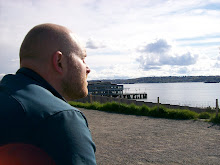learnings so far...

My observations so far are pretty basic. Churches at their best reflect the culture that they exist in. I guess that is pretty obvious. The church is a group of people from a certain area and when those people gather it makes sense that they look like where they are from. BH is full of, but not limited to, smart, outdoor loving, white, middle class people. Madison is full of those people. Portland, ditto. Therefore since we look like the areas we come from then it would not really make much sense to want to be like a Portland church when we are not in Portland. I do love how organic the language is here. I do love how green, easy-going, thoughtful the Christian community here is. Also there seems to be something in the water that makes everyone love to take broken things and make them beautiful. I think that has inspired 90% of the art here. Here it is not a Christian thing, it is a Portland thing.
In Madison, how can we be more thoughtful, more organic, greener and take what is broken around us and through the power of the Holy Spirit reveal beauty? That is something I want to be part of. But I don’t want to just be part of a Madison thing. I want to be part of a God thing. What is there that is counter-cultural to Madison but fully cultural to the kingdom of God? What aligns? I guess it doesn't matter whether or not it is already part of the culture. The point is not to defy nor submit to worldly culture but instead live out the kingdom wherever we are and in doing so we will not conform to the world. This gets annoyingly simple and infinitely difficult at the same moment. Do we love others like we love ourselves? Do we give to those in need? Do we open our homes, our lives to those around us? Do we heal the sick, feed the hungry, cloth the naked, adopt the orphan, ask for help from others, worship the King?
I guess the benefit of seeing others in action is not to replicate but to spark imagination.





